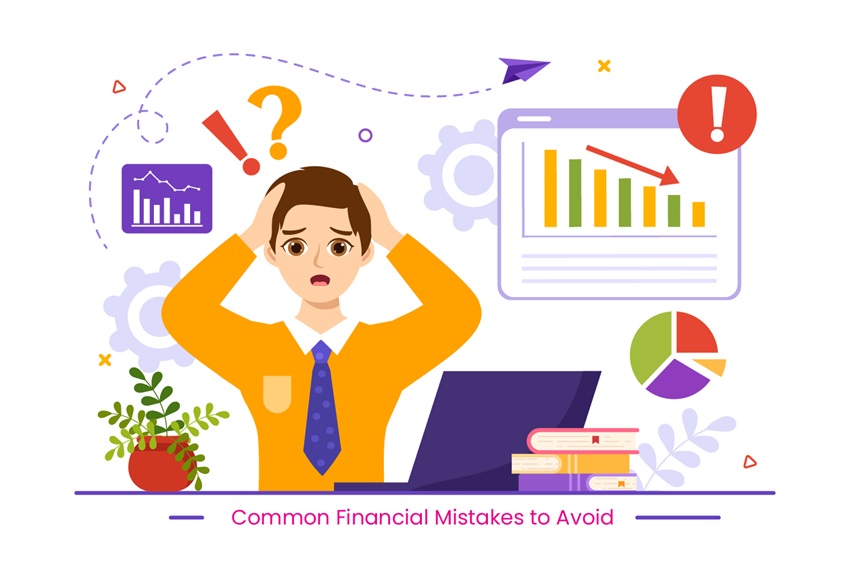
Common Financial Mistakes and How to Avoid Them
Managing money isn’t always easy—especially when no one teaches you how to do it. Many people learn financial habits through trial and error, often making costly mistakes along the way. But the good news is, by understanding the most common financial pitfalls, you can take proactive steps to avoid them and build a healthier relationship with your money.
In this guide, we’ll break down some of the most typical financial mistakes people make and offer practical tips on how to steer clear of them. Whether you’re just starting out or looking to improve your current situation, avoiding these missteps can put you on the path to long-term financial success.
1. Living Beyond Your Means
The Mistake:
Spending more than you earn is one of the fastest ways to get into financial trouble. It often leads to accumulating credit card debt, living paycheck to paycheck, and feeling constantly stressed about money.
How to Avoid It:
- Track your income and expenses with a budget
- Differentiate between wants and needs
- Practice delayed gratification—wait before making big purchases
- Set spending limits on non-essential categories like dining out or entertainment
2. Not Having an Emergency Fund
The Mistake:
Many people skip building an emergency fund and find themselves unprepared when unexpected expenses—like car repairs or medical bills—come up. This often leads to reliance on credit cards or loans, which can create a cycle of debt.
How to Avoid It:
- Aim to save 3–6 months’ worth of expenses in a separate savings account
- Start small—even $20 a week adds up over time
- Treat your emergency fund as untouchable unless it’s a true emergency
3. Ignoring Your Credit Score
The Mistake:
A poor credit score can make it harder to qualify for loans, rent an apartment, or even get certain jobs. Ignoring your credit health means you may not notice errors or areas that need improvement.
How to Avoid It:
- Check your credit report regularly (at least once a year)
- Always pay bills on time—payment history is a major factor
- Keep your credit utilization low (under 30% of your credit limit)
- Avoid applying for multiple credit accounts in a short time frame
4. Carrying High-Interest Debt
The Mistake:
Letting high-interest debt—especially from credit cards—accumulate can severely impact your finances. The longer it sits, the more it costs, and the harder it is to pay off.
How to Avoid It:
- Pay off credit card balances in full each month if possible
- If you carry debt, focus on paying down the highest-interest ones first (the avalanche method)
- Consider balance transfer cards or debt consolidation for lower interest rates
5. Not Saving for Retirement
The Mistake:
Putting off retirement savings—especially when you’re young—can lead to not having enough money in your later years. The longer you wait, the more you’ll need to save each month to catch up.
How to Avoid It:
- Start saving as early as possible, even small amounts
- Take advantage of employer-sponsored retirement plans and matching contributions
- Set a goal to increase contributions gradually over time
- Invest your retirement savings for growth (e.g., through index funds or mutual funds)
6. Lack of Financial Goals
The Mistake:
Without clear financial goals, it’s easy to drift from paycheck to paycheck without making progress. Vague goals like “save more” or “spend less” don’t provide direction.
How to Avoid It:
- Set SMART goals (Specific, Measurable, Achievable, Relevant, Time-bound)
- Break big goals into smaller steps (e.g., save $500 for a vacation over 5 months)
- Regularly review your goals and adjust them as needed
7. Impulse Spending
The Mistake:
Impulse buying—especially online or with credit cards—can sabotage your budget and lead to buyer’s remorse. It’s one of the most common ways people overspend.
How to Avoid It:
- Create a 24-hour rule: wait a day before buying non-essential items
- Unsubscribe from marketing emails and remove saved payment info from shopping apps
- Make a list before shopping and stick to it
- Track your spending habits to identify triggers
8. Failing to Plan for Big Expenses
The Mistake:
Not preparing for large, predictable expenses—like holidays, weddings, car maintenance, or tuition—can throw your budget off track.
How to Avoid It:
- Use sinking funds: set aside a little each month for upcoming big expenses
- Create a yearly financial calendar to anticipate known costs
- Avoid using credit for planned expenses—save in advance instead
9. Not Investing
The Mistake:
Keeping all your savings in cash or low-interest accounts might feel safe, but it often means losing purchasing power over time due to inflation.
How to Avoid It:
- Educate yourself on the basics of investing
- Start with low-risk options like index funds or robo-advisors
- Invest regularly and for the long term—don’t try to time the market
- Make sure your investments align with your goals and risk tolerance
10. Going It Alone
The Mistake:
Trying to figure everything out on your own without asking for help can lead to missed opportunities or costly errors.
How to Avoid It:
- Talk to a financial advisor or coach—many offer free consultations
- Use reliable online resources and financial tools
- Don’t be afraid to ask questions or get a second opinion before making big decisions
Final Thoughts
Financial mistakes happen, but they don’t have to define your future. The key is to learn from them, make intentional changes, and stay informed. By avoiding these common pitfalls and developing good financial habits, you can build a stronger foundation and enjoy greater peace of mind.
Start where you are, use what you have, and take one step at a time—your financial well-being is worth it.
